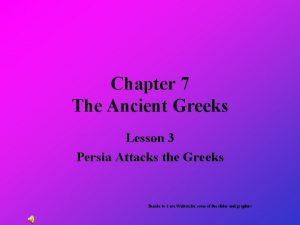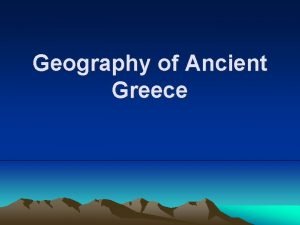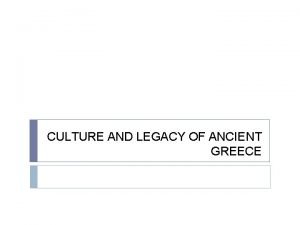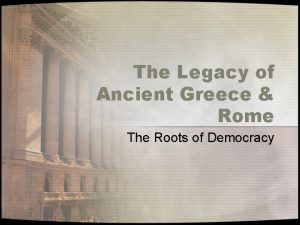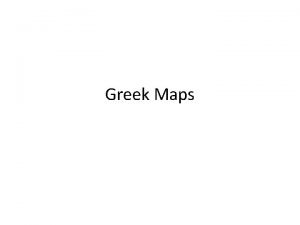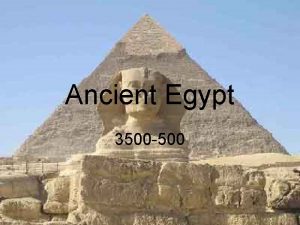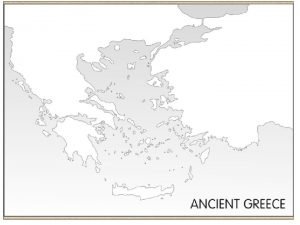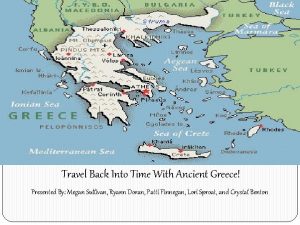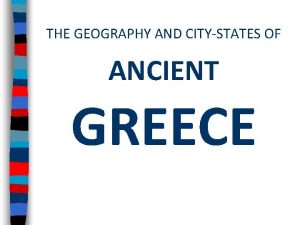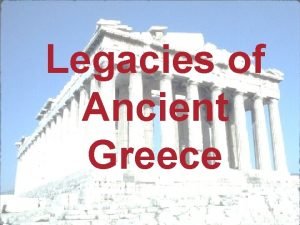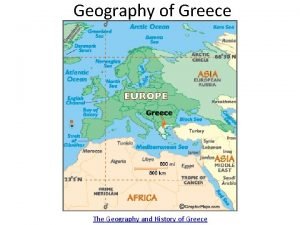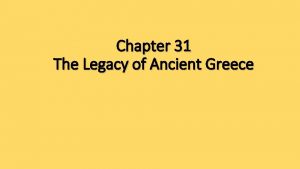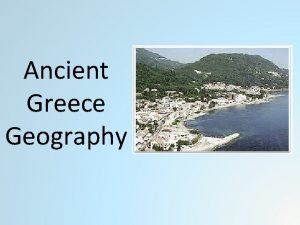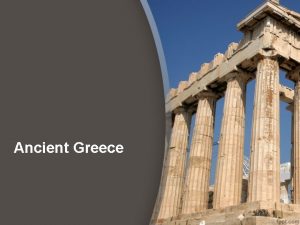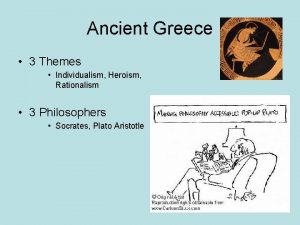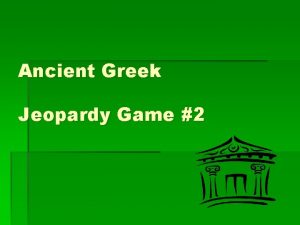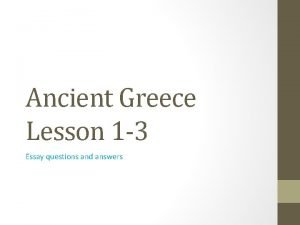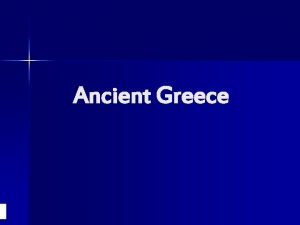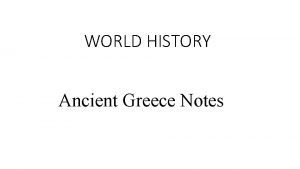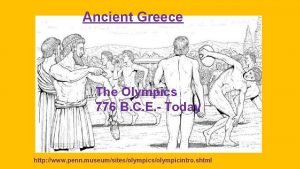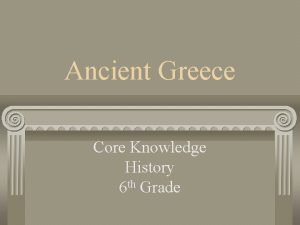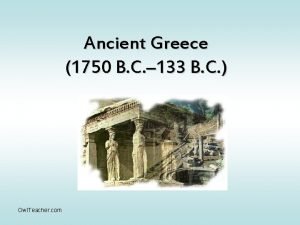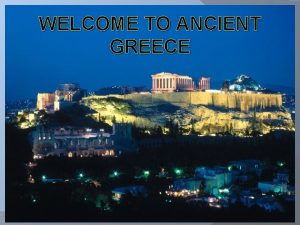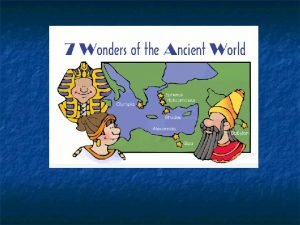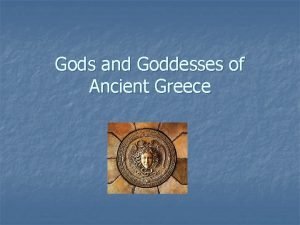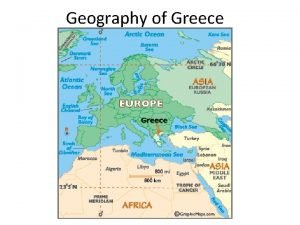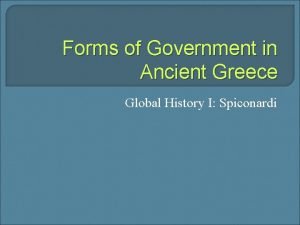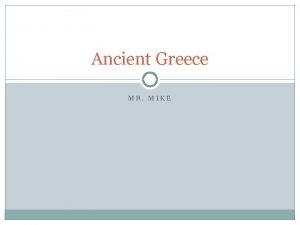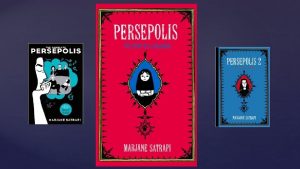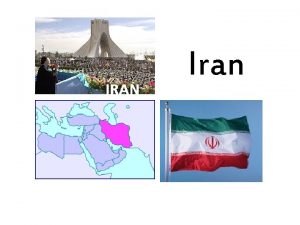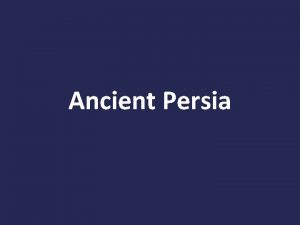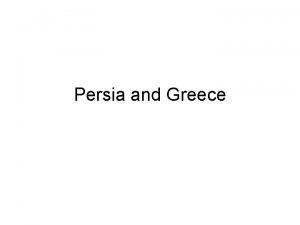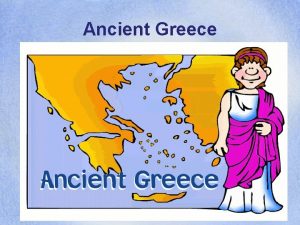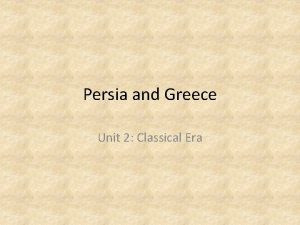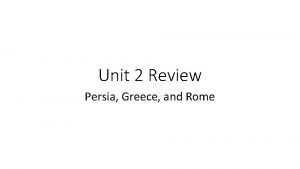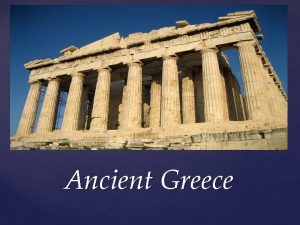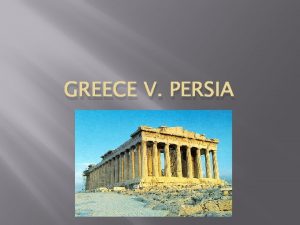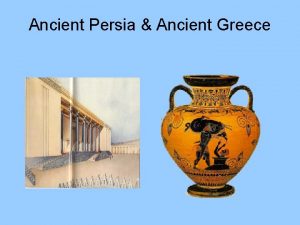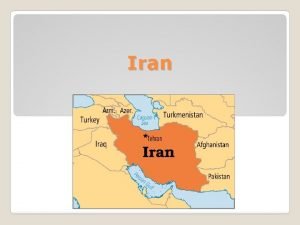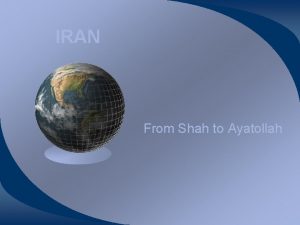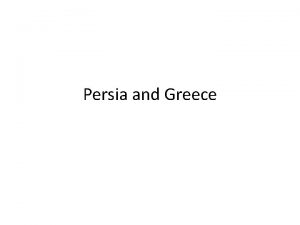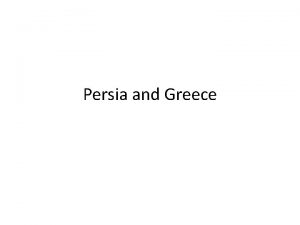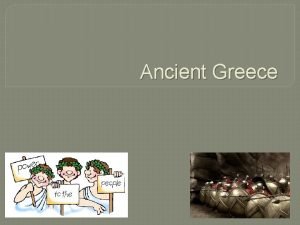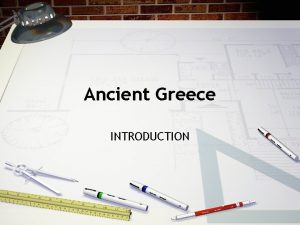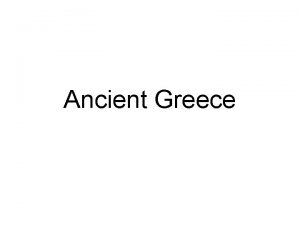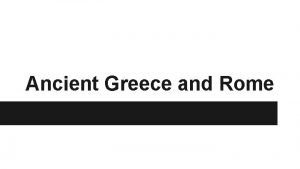Greece and Iran Ancient Iran Persia 1000 500







































- Slides: 39

Greece and Iran

Ancient Iran (Persia) 1000 -500 BCE

Land of the Aryans • Iran, Afghanistan, Pakistan, Turkmenistan • Link between western Asia and central/southern Asia • Majority of surviving historical accounts are Greek

Persian Empire • Medes o Western portion o First group to achieve complex political organization in the area • Persians o Southeastern portion o Achaemenids • The two groups intermarried to create the empire

Cyrus • Persian father, Median mother • United Persian tribes and overthrew Median monarch • Placed both races in positions of authority • Kept Median traditions/government structure • Defeated Lydia, Anatolia, some Greek city-states, Neo -Babylonian dynasty

Darius I • Diminished the official role of the Medes • Second founder of the Persian Empire o Stretched empire from eastern Europe to Libya and Russia o New organizational structure that would continue until the end of the empire

New Organizational Structure • Divided empire • 20 provinces • Satrap: Persian “governor” in charge of a province o Collect taxes o Local court system o Hereditary (eventually)

Persian Royal Road • 1600 miles • Postal system o Royal messengers could travel across empire from modern Turkey to Iran within roughly a week • 111 rest stops o Caravanserai o Guards at each stop

Persian Royal Road

Society • Patriarchal • Warriors o King o Landowning aristocracy o Women had political influence, could own property • Priests o AKA magi • Peasants o o Labor units divided by men, women, children, etc Officials distributed food and other necessities Pregnant women/women with babies received extra Skilled laborers received more than unskilled

Decline of the Achaemenid Empire ■ Policy of toleration under Cyrus, Darius ❑ ■ ■ Rebuilding of temple in Jerusalem Xerxes (486 -465 B. C. E. ) harshly represses rebellions in Mesopotamia and Egypt Increasing public discontent © 2011, The Mc. Graw-Hill Companies, Inc. All Rights Reserved. *

Capital(s) Susa • Administrative center of empire • In geographical center • Elam/Mesopotamia • Near modern Iran/Iraq border • Location of the tomb of the prophet Daniel (? ) persepolis • • Ceremonial capital Persian homeland Symbol of power/wealth Marriages, coronations, burials • Propaganda relief sculptures o Images of all classes all willingly cooperating together

Susa

Persepolis

Zoroastrianism • The Gathas: ancient Iranian hymn by Zoroaster • Ahuramazda (like the car ) – chief god o Created the world • • World damaged by Angra Mainyu (hostile spirit) Struggle between good and evil Afterlife = reward/punishment depending on life lived Darius tied his reign to religion by claiming to be appointed by Ahuramazda

Zoroastrianism • Belief in one supreme deity • High ethical/moral standard for humans • Promised salvation • Influenced Judaism (? )

Ancient Greece 1000 -500 BCE

Classical Greece, 800 -350 B. C. E. © 2011, The Mc. Graw-Hill Companies, Inc. All Rights Reserved. *

Geography/Resources • Limited fertile/arable land o Rocky, mountainous landscape o Grains, olive trees, sheep/goats • Dependence on the sea and trade o Geography made land transportation difficult o Could travel from Greece to Anatolia almost without losing sight of land

Dark Age • 150 -800 BCE • Depopulation, poverty, disappearance from historical record • Following the destruction of Mycenaean civilization • Isolation from outer world Archaic Period • 800 -480 BCE • Dark Age ends with arrival of Phoenician ships to the Aegean o Writing system o Greeks added vowel sounds—the first true alphabet o Fewer symbols than cuneiform/hieroglyphics—easier for common people to learn • Population explosion o Shift to farming and diet change o Caused urban centers and specialization to develop

Polis • “City-state” • Greece made up of hundreds of polis due to geography o Hard to be unified • Acropolis: hilltop fortification • Agora: Large, open area / marketplace

Hoplites and Colonization • Hoplite: heavily armored infantrymen • Army of private citizens • Usually farmers during “off season” • Excess population sent to colonies o Black Sea, North Africa, Italy • Greek culture spread with colonists • “Hellenes” described the Greek • “Barbaroi” described “barbarians” • Invention/use of coinage

Politics • Dark Ages: rule of kings o Eventually councils took the place of kings o Aristocracy • Tyrant o o 7 th and 6 th centuries BCE Seizure of power and violation of traditional politics Usually aristocrats supported by middle class Eventually overthrown for either an oligarchy or democracy • Oligarchy o Rule by a few wealthy families • Democracy o Political power by all free adult males

Culture • Religion o Zeus, Poseidon: gods that represented nature o Majority of gods were male o Epic poems (e. g. the Iliad and the Odyssey by Homer)gave the gods anthropomorphic characteristics o Sacrifice o Oracles: Apollo at Delphi • Intellect o Emphasis on the individual o Lyric poetry focusing on personal experience/ emotion o Rejection of traditional religious beliefs o Herodotus • First to write prose • Father of History

Athens vs. Sparta

This. Is. Sparta!!!

Sparta (No, really) • 7 th century BCE o Shortage of farm land o Population increase • Invasion of Messenia (neighbor) INSTEAD of colonization o Native population became helots (state-owned serfs) o Spartans feared helot uprising • Military state o Permanently prepared for war o Best army in Greece o Boys sent to military school at 7 • Peloponnesian League o System of alliances between Sparta and other neighbors o Maintained peace in the region (for a while)

Athens • Larger in size and population than other polis • Fertile land, olive trees • Solon Averted civil war in Athens Divided Athens into 4 classes Top 3 classes can hold office Lowest class can still participate in meetings o Allowed for freedom of citizens o o • Pisistratus o Tyrant that created an Athenian “identity” o Monumental building project festivals • Pericles o 460/450 BCE o All power to body of government o The Assembly o The Council of 500 o The People’s Courts

WAR

Persian Wars • Ionian Revolt o Greeks in western Persia revolted against the Persians o Took the Persians 5 years to stop the rebellion • 490 BCE o Darius sends troops to Eretria and Athens (both helped in the Ionian Revolt) o Eretria falls; survivors sent into exile in Iran o Athens: hoplites defeat Persians at the Battle of Marathon • 480 BCE o o Xerxes sends forces and takes over portions of southern Greece Hellenic League (Sparta and allies) 300 Spartans die at Thermopylae Persians sack Athens, then navy is destroyed at Salamis • Defeat of Persia leads to the creation of the Delian League o Alliance of city-states under the leadership of Athens o Athens eventually takes advantage of the League and becomes imperial power


Philosophy • Socrates o Put on trial, convicted of “corrupting” Athenian youth o Forced suicide o Socratic method: questioning for deeper understanding • Plato o Founder of “the Academy” o Refused to write down thoughts/training • Aristotle o o Student at the Academy Founder of the Lyceum Politics, philosophy, poetry, physics, psychology, etc Tutor to Alexander the Great

Athenian “Equality” • Trireme o Warship with 170 rowers • Hoplites: now members of the middle/upper class • Rowers: lower class o Could demand equal rights b/c they were the backbone of the power • Only 10 -15% of the population actually had a voice o Women, children, slaves excluded • Women o Athens • Arranged marriage • Relegated to the home • Bear/raise children (males) o Sparta • Expected to raise strong soldiers • Encouraged to exercise • Slavery rationalized o Most families owned 1 slave o Foreigners lacked the ability to reason/think for themselves

Peloponnesian War • Sparta vs. Athens • 30 years of fighting • 404 BCE: Defeat of Athenian navy • Sparta took over the Athenian “empire” o Same attitude toward others that Athens had o Internal fighting between other city states • Allowed the Persians to conquer lost lands

The Macedonians Philip II • King of Macedonia • Created a military power in the Greek world • Hoplites o Spears o Horses/cavalry o Catapults • Corinth o Confederacy of states o Control of Greece Alexander the Great • Defeated the Persian king, Darius III • Kept Persian style administration in conquered lands o Placed Macedonians in power o Eventually placed Persians in power/married Iranian women • Alexandria, Egypt • Died in 323 BCE

Hellenistic Age • Hellenistic Age o Spread and influence of Greek culture spread by Alexander’s empire • No clear successor to Alexander’s empire o 50 years of unrest o Empire divided into 3 Hellenistic kingdoms • Seleucid (Persia) • Ptolemaic (Egypt) • Antigonid (Greece/Macedonia)

Map 5 -3, p. 144

Hellenistic Kingdoms • Seleucids o Majority of Alexander’s lands o Mesopotamia, Syria, Anatolia o Many ethnic groups within the kingdom • Hard to control o Many threats from invasion o Persian administration • Antigonid o One main ethnic group o Macedonian homeland, northern Greece o Athens was a “museum” town • Ptolemies o One ethnic group • Easy to control o Pharaoh o Linked Egypt to the Mediterranean • Encouraged Greek immigration o Rule from Alexandria • Greek style polis • Alexandria o Body of Alexander “legitimized” the rule of the Ptolemies o Lighthouse of Alexandria o Library of Alexandria

Syncretism • Diffusion o The spread of a culture, religion, idea WITHOUT changing the culture, religion, idea o EX: Spilled paint spreads out but doesn’t change colors • Syncretism o The spread of a culture, religion, idea and the changing of that culture, religion, idea into something new o EX: Two colors are spilled (blue and yellow) and make a new color (green)
 Lesson 3 greece and persia
Lesson 3 greece and persia Babylon medo-persia greece rome timeline
Babylon medo-persia greece rome timeline Aims and objectives of physical education in greece
Aims and objectives of physical education in greece Ancient greece map seas
Ancient greece map seas Ancient greece stations
Ancient greece stations The legacy of ancient greece and rome
The legacy of ancient greece and rome 100 200 300 400 500
100 200 300 400 500 Map of greece 500 bc
Map of greece 500 bc 3500 - 500
3500 - 500 Ancient greece map with labels
Ancient greece map with labels Where was ancient greece located
Where was ancient greece located Ancient greece contributions
Ancient greece contributions Geography of greece
Geography of greece The legacies of ancient greece
The legacies of ancient greece Labeled ancient greece map
Labeled ancient greece map The legacy of ancient greece chapter 31
The legacy of ancient greece chapter 31 Facts about greek music
Facts about greek music Greek culture values
Greek culture values What continent is greece in
What continent is greece in 8
8 Balkan peninsula ancient greece map
Balkan peninsula ancient greece map Balkan peninsula ancient greece
Balkan peninsula ancient greece Ancient greece map balkan peninsula
Ancient greece map balkan peninsula Individualism in the school of athens
Individualism in the school of athens Who wrote the republic in ancient greece
Who wrote the republic in ancient greece Ancient greece travel brochure project
Ancient greece travel brochure project Ancient greece jeopardy
Ancient greece jeopardy Ancient greece essay topics
Ancient greece essay topics Is greece a peninsula
Is greece a peninsula Map of sparta greece
Map of sparta greece Greek tragedy masks
Greek tragedy masks Olympics greece
Olympics greece Core knowledge ancient greece
Core knowledge ancient greece Ancient greece 1750 b.c-133 b.c answers
Ancient greece 1750 b.c-133 b.c answers Abcs of greece
Abcs of greece 7 wonders of ancient greece
7 wonders of ancient greece Ancient greek flag
Ancient greek flag Saturn god daughter
Saturn god daughter Ancient greece balkan peninsula
Ancient greece balkan peninsula Oligarchy etymology
Oligarchy etymology
